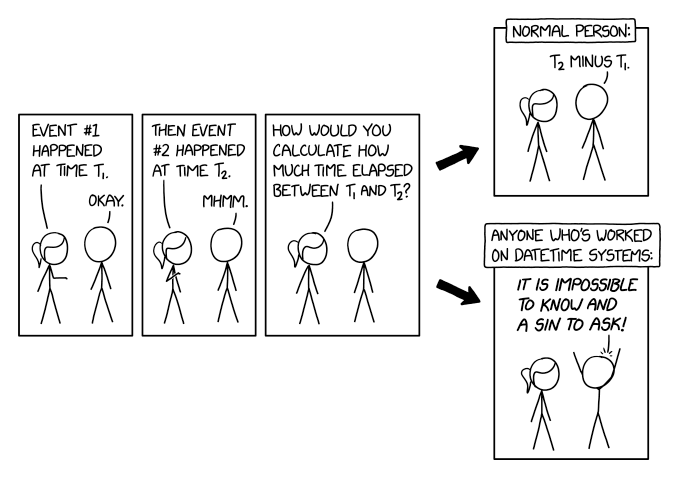
Yesterday was February 29, and yes, things broke. Z Energy, Caltex, and Allied Petroleum network service stations were hit by pay at the pump outages for around 10 hours. The story went around the world and the fuel companies' technology provider Invenco had to scramble to quickly come up with a fix for the issue.
Actually, to be precise, it was February 29 yesterday in New Zealand as we live in the future. Today it's March 1 here, but February 29 in other parts of the world; hold that thought for a moment.
A quick look at the news shows that virtual desktop provider Citrix ran into trouble on leap year day with its HDX video redirection service. It looks like it was the same problem as four years ago, ironically enough.
Some of security vendor Sophos' products could not verify Transport Layer Security (TLS) digital certificates, and users saw alarming error messages. There were a few other glitches, with Japan Today reporting that police in some prefectures were unable to issue driver's licenses due to system errors.
The above examples seem way too few considering how difficult it is for computers to handle time-related issues. Time zones, leap years, daylight savings... ask any coder about the chaos not getting those things right can create, and you'll get some good war stories.
Long story short, computers very much depend on accurate time to sync their clocks with to work properly, which is among other things why we have the Network Time Protocol (NTP) running on Internet-accessible servers.
Here are the NZ NTP pool servers.
Did you see any other Leap Year glitches? Particularly today, elsewhere in the world where it's Feb 29. Let us know in the comments.
This is not particularly technology related, but you have to admire the sheer accidental ingenuity behind La Bougie du Sapeur, a Parisian quadrennial newspaper that was created as an elaborate joke in 1980.
With a price of NZ$8.70 (subscriptions are €100 per century), the paper has print run of 200,000 and a publishing date of February 29. There's a Sunday supplement coming up... in 2032.
Update
Via Antz in the comments, XKCD has the last word:

Update 2: A representative for Sophos said the security vendor had advised customers that they may experience the above issue if SSL/TLS decryption of HTTPS websites is enabled in the Threat Protection policy and rebooted on February 29, 2024. However, the setting is disabled by default for all users, and would have to be enabled for the problem to occur, the representative said.
17 Comments
Agreed, haven't seen any other instances, but this pretty much sums it up ... xkcd: DateTime
Brilliant thanks, will add that XKCD,
I've got a 30 year old Casio digital watch that's probably not worth $5 and it has coped perfectly well with the leap year and will continue to do so.
Time is difficult for computers, leap years particularly so...
I disagree, it is just programming. This is evidence of poor programming.
Will we have a repeat on 29 Feb 2028?
Very poor programming.
Pay peanuts, get monkeys. Includes the managers that sign off test plans then declare, when it passes the test plan, "It's finished".
A fish is known to rot from the head on down. When I first started programming I was told, "Just divide the year by 4 and if the remainder is zero then it's a leap year". I pointed out that's wrong. I was told to shut up and do as I was told. (I didn't. I coded it correctly. Took all of 15 minutes. Not on my watch buddy.)
You will be hated by the industry as there won’t be problems to fix if you carry on like that…
Surely you would use a library for dates. And surely those libraries are capable of handling leap years correctly.
Dude! This was back in the 70s. I was writing the libraries everyone takes for granted nowadays!
Yep very poor programming, I have a Casio stopwatch purchased in 1990 is still has the full calendar programmed in it way out from now, worst ever was a Mitsubishi S-VHS, they only put like 7 years of calendar in it, had to fudge the year after that to get the day/date correct if I wanted to set the record timer.
Falsehoods programmers believe about time [2012]: https://infiniteundo.com/post/25326999628/falsehoods-programmers-believ…
Excellent piece!
Y2K didn’t cause any problems as the new millennium ticked over. Fears of an Armageddon with many stock piling food . . . and widespread concerns that computer controlled water supply and sewage systems would crash.
And here we are seven leap years later with a problem. 😬
There was a lot of work going around preparing computer systems for dates that started with a 2 not a 1.
Oh yes, it really bugs me when people say Y2K was a non-event without understanding and appreciating the hard work before to stop things going to pot.
I was a long-haul pilot, and the company I worked for had trouble finding pilots to work over Y2K because they were concerned the navigation and other systems on board that relied on time would crash. There was also concerns about Air Traffic Control systems going down.
Well, that taught me a lot about how much I didn't know, and how happy I have been to disregard daylight savings infleunce, particularly as operations (eg a payment) operates in a whole different side of the planet.
As for this bit:
"For instance: in the Jewish calendar, days start at sunset not midnight."
This bit alone should qualify programmers for mental health support and hair replacement surgery for the rest of their lives.

We welcome your comments below. If you are not already registered, please register to comment
Remember we welcome robust, respectful and insightful debate. We don't welcome abusive or defamatory comments and will de-register those repeatedly making such comments. Our current comment policy is here.